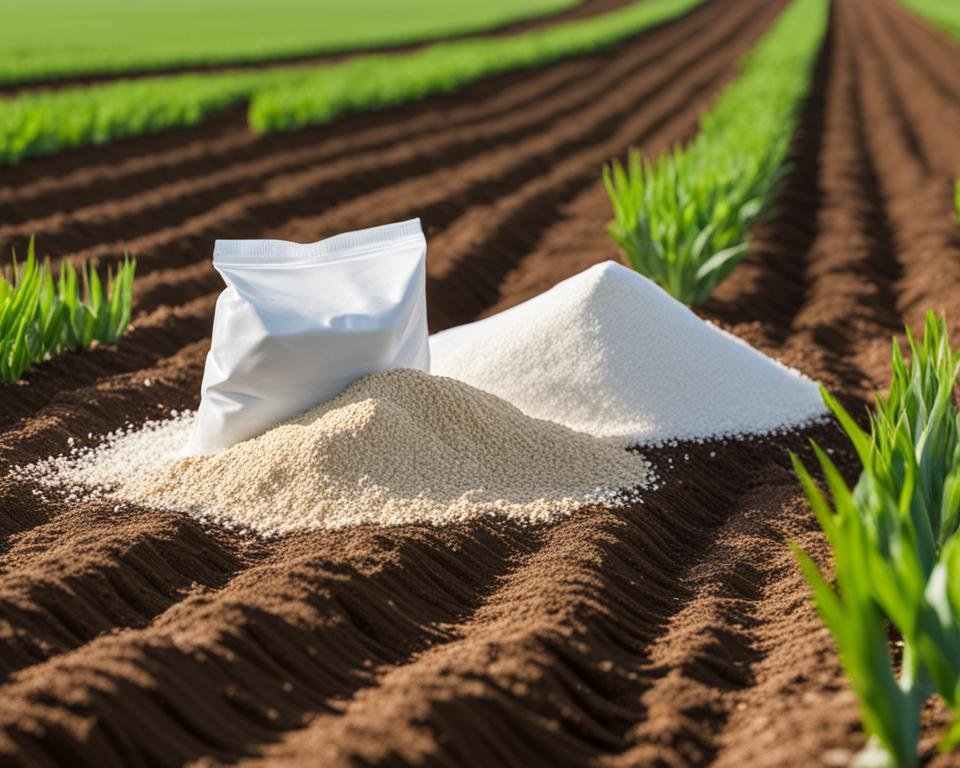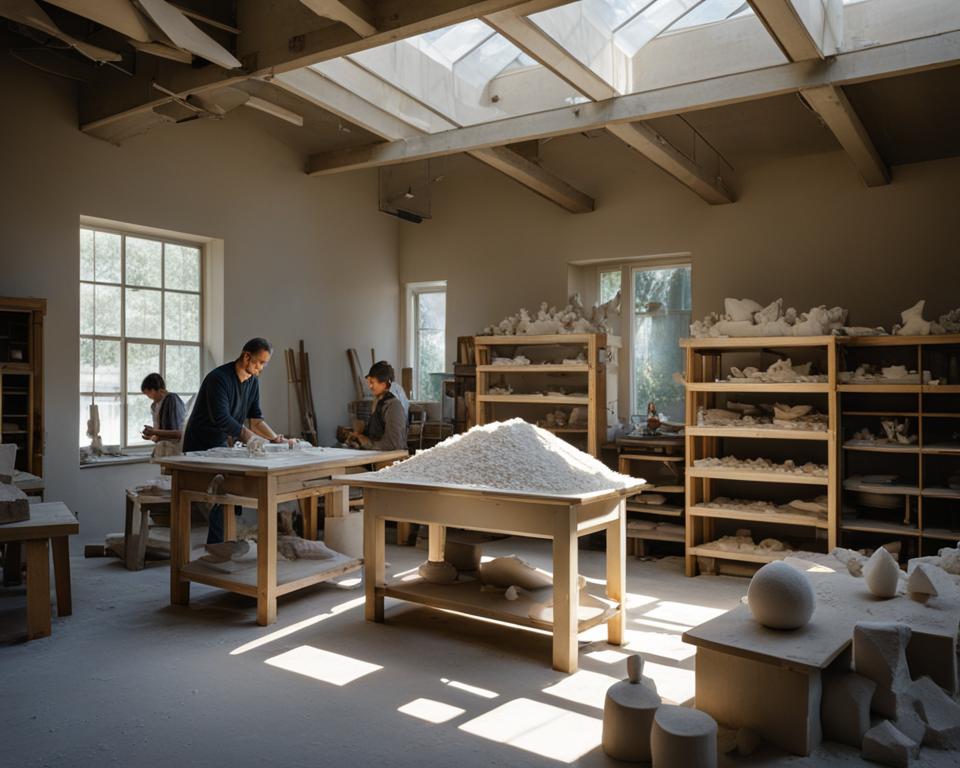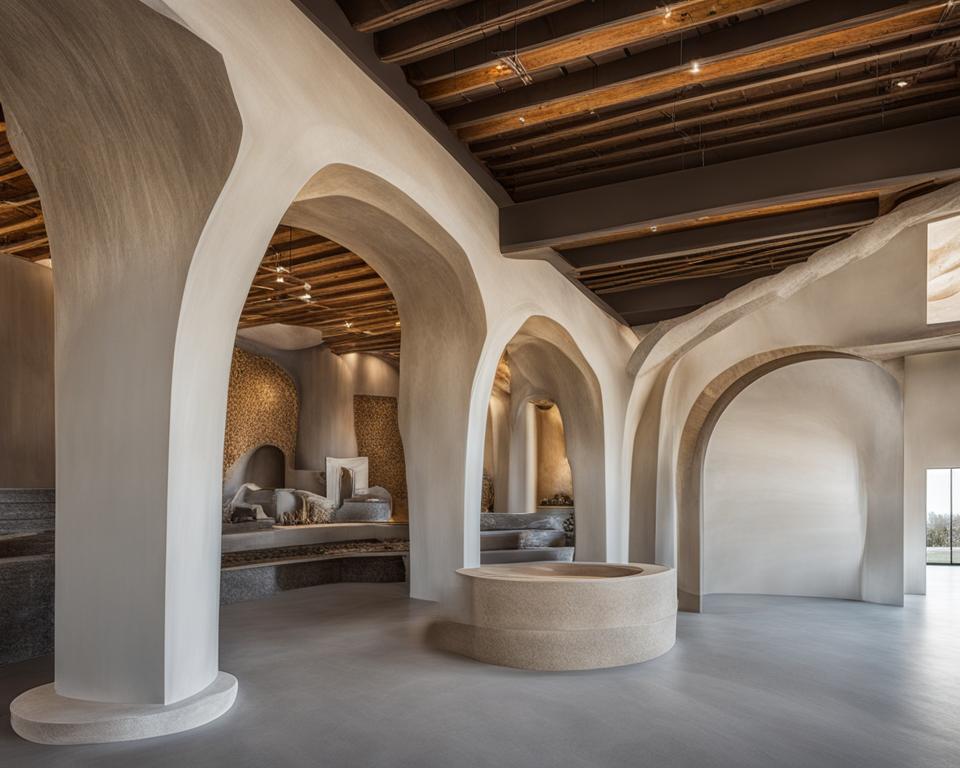Gypsum, a naturally occurring mineral, is widely known for its diverse applications across various industries. Its unique properties, such as fire resistance, soundproofing, and moisture control, make it a valuable resource for construction, while its soil conditioning properties make it a crucial element in agriculture. Additionally, gypsum has found its place in the manufacturing industry, artistic field, medical sector, and environmental applications.
Key Takeaways
- Gypsum is a versatile mineral with numerous applications.
- Gypsum is used extensively in construction, as it provides fire resistance, soundproofing, and moisture control.
- Gypsum helps improve soil structure, drainage, and fertility, leading to better crop yields.
- Gypsum is utilized in the manufacturing industry to create products such as plaster and molds.
- Artists and sculptors use gypsum due to its unique qualities that make it easily moldable and capable of holding intricate details.
Gypsum in Construction
Gypsum has made significant contributions to the construction industry, providing essential components for structures worldwide. One of the most common uses of gypsum in construction is through the creation of gypsum boards. Gypsum boards, also known as drywall, are commonly used in interior walls and ceilings. Thanks to the durability, flexibility, and ease of installation of these panels, gypsum boards have become a staple in modern construction projects.
Moreover, gypsum boards provide a host of benefits, including excellent fire resistance, soundproofing, and moisture control. When used as a fire-resistant construction material, gypsum boards help limit the spread of flames and smoke in a building, making it safer for its occupants. Gypsum board also works well for sound control, which can help keep the noise levels down between rooms, especially in multi-story buildings.
The versatility of gypsum in construction can also be seen in the many other building materials that utilize it, such as plaster, roofing materials, and cement. Thanks to its affordability and abundance, gypsum is a reliable and sustainable option for both small and large-scale building projects.

Agricultural Uses of Gypsum
Gypsum is an essential mineral that has been widely used in agriculture for decades. Its uses in this field are numerous and highly beneficial to crops and soils. One of the primary uses of gypsum in agriculture is as a soil conditioner. When added to soil, gypsum improves its structure and drainage, promoting better root growth and increased water absorption. This enhances the soil’s ability to retain nutrients, thus boosting crop yield.
Moreover, gypsum is highly effective in enhancing nutrient availability for plants. It provides calcium and sulfur, which are essential nutrients for healthy plant growth. The addition of gypsum to soil increases the solubility of phosphorus, making it more available to plants.
Gypsum has also proven to be an effective source of calcium and sulfur in fertilizers. It not only provides nutrients but also improves the soil’s physical properties, leading to better plant growth and higher crop yield. Gypsum fertilizer is suitable for various types of crops, including vegetables, fruits, and grains, making it an ideal fertilizer choice across a wide range of agricultural applications.

Gypsum in the Manufacturing Industry
Gypsum has a significant role in the manufacturing industry due to its versatile properties. It is a key ingredient in creating gypsum plaster that is widely used for walls and decorative elements in architecture and interior design. Gypsum products such as drywall and ceiling tiles are also popular choices for aesthetic and functional reasons.
In addition to creating finishes and surfaces, gypsum is also critical in producing molds. The manufacturing industry uses gypsum to create molds for ceramic, pottery, and metal casting. The mineral’s moldability and ability to hold intricate details make it a popular choice for craftsmen and manufacturers alike.

Gypsum Plaster Applications
- Gypsum plaster offers superior fire resistance and soundproofing.
- Gypsum plaster is easily applied and requires minimal curing time.
- Gypsum plaster is a cost-effective solution for creating aesthetic accents.
Mold Making Applications
- Gypsum molds offer precise detail and accuracy for mass production.
- Gypsum molds allow for versatility in casting materials, including metals and ceramics.
- Gypsum molds can be easily replicated for consistent production.
Overall, the manufacturing industry benefits greatly from the many applications of gypsum. From creating finishes and surfaces to producing molds, this mineral continues to be a valuable asset to manufacturers in various fields.
Gypsum in the Artistic Field
The versatility of gypsum in sculpting makes it an excellent choice for artists and sculptors. The mineral’s ability to be easily molded and hold intricate details makes it a popular choice for creating gypsum sculptures. Artists can use gypsum to create various art installations, ranging from small decorative pieces to larger-than-life sculptures.
One famous example of gypsum sculptures is Auguste Rodin’s “The Gates of Hell”, a large-scale work of art featuring dozens of figures made of gypsum. The art installation showcases the mineral’s ability to be molded and hold intricate details, resulting in a stunning work of art.
Gypsum is a versatile material, and with the help of modern technology, artists are now exploring new possibilities of its application. One such example is 3D printing, where gypsum can be used as a material to print intricate sculptures and impressive art installations.

In conclusion, gypsum’s moldability and intricate detailing make it a perfect choice for artists and sculptors. The mineral offers a range of possibilities for creating beautiful gypsum sculptures and art installations, making it a sought-after material in the artistic community.
Gypsum in the Medical Sector
Gypsum is widely used in the medical sector due to its unique properties. Dental plaster, made from gypsum, is extensively used in dentistry for making impressions and molds of teeth. Orthopedic casts, made from gypsum, are used for immobilizing bones after injuries or surgeries to aid in the healing process. Additionally, gypsum is used in creating medical models for teaching and research purposes. These medical models are used by medical professionals to study human anatomy and develop surgical techniques.
Gypsum casts are preferred for their strength, durability, and lightweight nature, making them highly suitable for orthopedic applications. Medical models made from plaster are 3D replicas that accurately mimic the human body, enabling medical students to practice and gain hands-on knowledge.

Uses of Dental Plaster
Dental plaster is a type of gypsum that is powdered and mixed with water to form a paste. This paste can be molded into various shapes and is mainly used to prepare impressions of teeth for dentures, crowns, and bridges. Dental plaster models provide an accurate representation of a patient’s mouth, allowing dentists to assess their teeth and jaw structure. In addition, dental plaster can also be used for making casts of oral tissues, aiding in the diagnosis of oral diseases.
Applications of Orthopedic Casts
Orthopedic casts made from gypsum are commonly used to provide support and immobilization to injured bones and joints. These casts are also used after orthopedic surgeries to aid in the healing process. Orthopedic casts made from gypsum are lightweight, strong, and durable, making them ideal for long-term use. They also provide good ventilation, preventing skin irritations and infections.
Medical Models for Research and Teaching
Medical models made from gypsum are used for both research and teaching purposes. These models are produced using advanced techniques such as 3D printing and digital scanning. They provide an accurate representation of the human body’s anatomy, enabling medical professionals to learn and practice complex surgical procedures before performing them on real patients. These models reduce the risks involved in surgical procedures while improving patient outcomes.
Gypsum in Environmental Applications
Gypsum plays a vital role in various environmental applications, making it a versatile mineral.
Landfill Covers
Landfills require proper management to prevent contamination and reduce odor. Gypsum is used as a landfill cover to limit the infiltration of moisture, prevent the emission of gases, and reduce the risk of groundwater pollution.
Water Treatment
Gypsum is employed in water treatment processes to remove impurities such as sediments and metals. It acts as a coagulating agent, helping to separate solid particles from the liquid phase. This process is known as flocculation, and it improves the water’s quality and purity.
Soil Erosion Control
Soil erosion control is essential for maintaining the quality and fertility of soil. Gypsum is used as a soil amendment to stabilize soil surfaces, reduce surface runoff, and prevent soil erosion. It improves soil structure, drainage, and nutrient availability, leading to healthy plant growth and higher crop yields.
Gypsum’s wide range of environmental applications makes it a valuable mineral for sustainable development, providing a natural solution for various environmental challenges.




